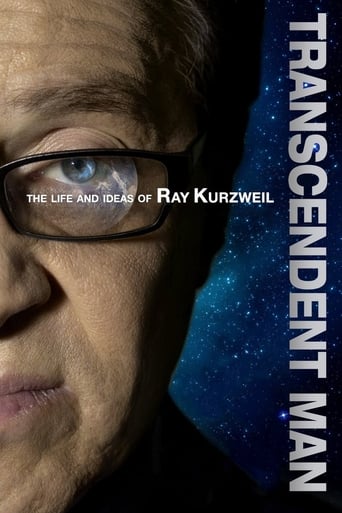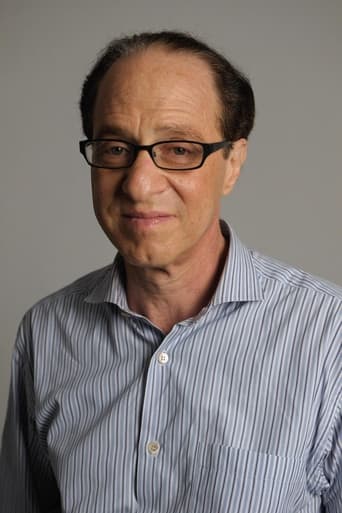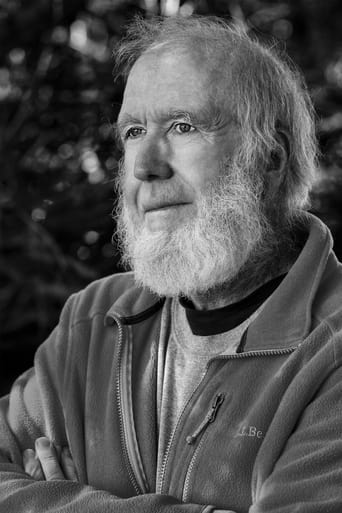

Transcendent Man (2009)
The compelling feature-length documentary film, by director Barry Ptolemy, chronicles the life and controversial ideas of luminary Ray Kurzweil. For more than three decades, inventor, futures, and New York Times best-selling author Ray Kurzweil has been one of the most respected and provocative advocates of the role of technology in our future.
Watch Trailer
Cast
Reviews
A different way of telling a story
Great movie! If you want to be entertained and have a few good laughs, see this movie. The music is also very good,
I enjoyed watching this film and would recommend other to give it a try , (as I am) but this movie, although enjoyable to watch due to the better than average acting fails to add anything new to its storyline that is all too familiar to these types of movies.
There's no way I can possibly love it entirely but I just think its ridiculously bad, but enjoyable at the same time.
One part biography, one part brain food; as an appetizer to the thought path of noted futurist Ray Kurzweil, it can be difficult at times to separate fact from fragment over the course of this documentary. Kurzweil's favorite subject is one of increasing relevance, perhaps even by the minute: he seeks to pinpoint the moment of so-called "singularity," when mankind's built-in body chemistry will finally cross the line into his rapidly-developing technological and biological know-how. In short - how soon will we be able to back up our thoughts and feelings to an external hard drive, what sort of moral and philosophical arguments will be made for and against the practice, and where will the ball of wax roll after that debate is behind us? Though its post-production effects can get a bit over-the-top at times, reminding viewers more than once of the over-ambitious "world of tomorrow" predictions popular in the 1950s, the film is largely successful at fostering a curious sort of fascination with the current point in history and the staggering number of possibilities present within our lifetime. Kurzweil himself is to thank for much of that, as his smooth, relaxed speaking gives the impression that anything is possible, even if (as some of his detractors point out during the film's apex) he completely overlooks humanity's tendency to use such moments for evil causes as well as good. Intensely interesting stuff that effectively sows the seeds of conception.
(www.plasticpals.com) Regardless of what you think of Ray Kurzweil, his predictions, or the singularity, they certainly make interesting subjects for a documentary. If you're new to the singularity, Transcendent Man gives a primer on what exponential growth in information technology may bring for genetics, nano technology, and robotics – all within the coming decades. His predictions extrapolate on existing technologies and are vague enough that there's enough wiggle room to be convincing, at least superficially. Fascinating though these ideas may be, I felt the intimate portrait of Kurzweil himself is the real heart of the film. When you see how many supplements he takes on a daily basis, to say he's an eccentric would be putting things lightly.Kurzweil believes, for example, that he will one day bring his father back from the dead. Not a biblical resurrection, mind you, but one based on data. He believes that he will be able to feed information about his father's life (boxes and boxes collecting his father's personal letters, music compositions, and other documents), including his own memories of him, into a computer simulation that will magically recreate his persona. Most of the time, I felt like I had a good grasp on the concepts discussed in the film, but I take issue with this. Assuming that such a simulation were possible, it could never be accurate because it would be based entirely on Kurzweil's perception of his father and scraps of information that can't possibly reflect the depth of one's soul (for lack of a better term). Others' perceptions are usually quite different from how we see ourselves, and people usually have a hard time understanding themselves in the first place! I can play along and say that maybe, someday, we'll be able to "back up" our brains onto computers, but without those brains, a simulation could never be perfect. I'm sure such a simulation would have beneficial psychological effects for the bereaved, but that's beside the point. It seems to me that if Kurzweil is willing to delude himself into believing a simulation of his father is as good as the real thing (or at least good enough to claim it will cure his father's death), then he is probably deluding himself about a lot of other things, too. The film does give us some perspective through dissenting opinions, but everyone interviewed (with the exception of a religious radio talk show host) agrees to some extent with what Kurzweil has predicted.It's fun to think that an artificial intelligence may bootstrap itself, and our own limited brains, into higher and higher levels of consciousness. Yet I can't help but be reminded of that old adage, "anything that seems too good to be true probably is". Scientists with expertise outside of Kurzweil's domain (such as biology) argue that he oversimplifies things. Others say he is simply overly optimistic. I don't think either accusation is unjust. The film paints Kurzweil as traumatized by the loss of his father, and terrified of his own mortality. It isn't surprising that some accuse him of pseudo-scientific religious quackery of the sort Kurzweil dismisses as comfort for the dying.
....but this whole film seems to be based on the foundation that every prediction Raymond Kurzweil has made so far has been correct, and that every invention he's created has been successful. I find this to be disingenuous at best. The handful of correct predictions presented as evidence merely serves to make me wonder : Did Kurzweil only make this small list of correct predictions, and shut up the rest of the time? Was his plethora of correct predictions so overwhelming that severe editing was required for brevity? I find this impossible to accept. If you want me to be impressed with your successes, Ray, you must admit your defeats. Kurzweil's claim that man's lifespan used to be 25 years is a blatant misuse of statistics. His claim of rapidly multiplying information ignores that much new information disproves old information. I'll stop now.
Ray Kurzweil has known he wanted to be an inventor from the age of 5, and has now been at it for all those years. Along the way he realized that the timing of inventions was critical to their success, otherwise most inventions fail. Think e-readers 10 years ago, tablet PC's 7 years ago, and the Apple Newton – all bombs then, but now the timing is right. So he started analyzing technology trends and discovered the "law of accelerating returns"; in summary that technology grows in a predictable and exponential patterns and that amazing things our in our future. Ray has had amazing success with his publicly made predictions. For instance, in the book "The Age of Spirtual Machines", he made 147 predictions for the year 2009, of which 86% are correct or essentially correct. (Reference: "How My Predictions are Faring, Ray Kurzweil, Oct. 2010; http://c0068172.cdn2.cloudfiles.rackspacecloud.com/predictions.pdf ) In other words when Ray Kurzweil speaks, people listen and you should too. I will admit, when I first heard is ideas of how man will evolve with technology, I was quite skeptical. But as I dug deeper into why he was saying this would happen, I began to see the trends are in his favor. Think about it; have you noticed that technology has been moving at a quickening pace lately? The film follows Ray over several years, catching him on his lecture circuit, at his company, his home, and traveling about. Throughout the film Ray explains the "law of accelerating returns" and where it will lead to. Also Ray's critics and supporters give their opinions throughout. Ray himself seems to be an incredibly calm individual who rarely strays from his relaxed tone of speaking. Ray's trends predict that technology trends are crossing over into health-care and that if you can live for another 15 years you have the chance of living a very long time. Ray's predictions give us hope in a time when so much around us seems gloomy. The documentary is a fascinating look at Ray and his ideas, and I highly recommend it.

